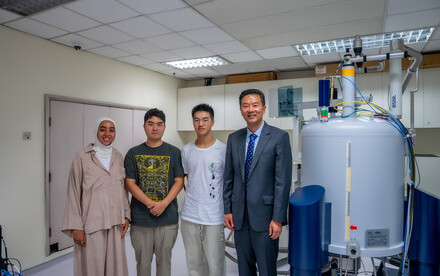05 Oct 2018
Closing on Calculus - Launch of Calculus E-learning Plaform

It is the mission of the SCNC1111 teaching team to lay a solid foundation in scientific and quantitative reasoning for science students. This includes a holistic introduction to calculus, as it is fundamental to learning science. Other than its obvious involvement in physical sciences, calculus also manifests itself in seemingly less mathematics-demanding biological sciences. Biochemists may run into differential equations of kinetics; ecologists may need similar tools to monitor population growth; nutritionists are likely to encounter terms such as area under the curve.
The teaching team has been facing a huge challenge stemming from the diverse mathematics background among the students. Take a closer look at the figures: around one-third of all freshmen in the Faculty of Science have not taken any formal lessons in calculus before, while the rest have successfully gone through the HKDSE with calculus.

What can be done to close this knowledge gap between students? Extra tutorials on calculus are seldom friendly to the schedule of every student, and it is difficult to ensure sufficient hands-on practice for everyone.
Closing the learning gap
To close the learning gap, the SCNC1111 teaching team launched an online learning platform in early 2015. This e-learning platform, funded by a Teaching Development Grant from the University, contains video tutorials that are 5 to 10 minutes long and are accompanied by automated quizzes. In the tutorials, the concepts of calculus were explained, one at a time, in layman terms with plenty of daily-life examples. The quizzes contain questions drawn from a large question bank created by the team. Answers and feedback are provided instantly, so that students could work at their convenience. The platform has effectively facilitated learning outside a traditional classroom.
Barely half a year into its launch, the team has observed some encouraging results. The pre- and post-course test scores showed that students’ competency in calculus has noticeably increased upon completion of the learning activities. More importantly, the difference in scores, between those who have completed the activities and those who have previously learnt calculus, has become statistically insignificant. This shows that the platform has the potential in closing the learning gap.

Close at fingertips
Currently the SCNC1111 teaching team is working to transform the e-learning platform into a mobile app, and its launch is to be expected in the near future. It is envisioned that, through the app, the knowledge of calculus could be brought to more interested learners, not just science students at HKU. The app, furthermore, will allow users to learn easily at their fingertips. Imagine learning calculus every time you catch a bus and mastering the basics in 3 months! Soon enough, everyone will be able to say, “Calculus is within my grasp.”







